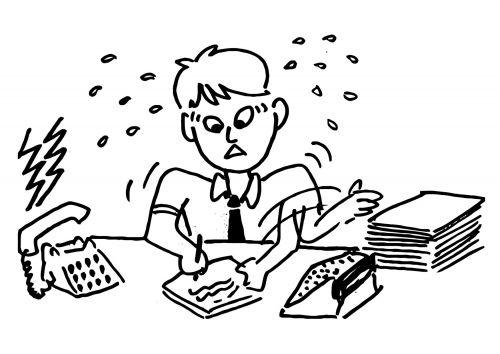Stress is like the water we swim in. Modern life is full of hassles, deadlines, frustrations, and demands. For many of us, stress is so commonplace that it has become a way of life.
In small doses, it can help us perform under pressure and motivate us to do our best. But when we’re constantly running in emergency mode, our mind and body pay the price.
One of the most insidious things about stress is that people caught in the early stages – the adrenaline rush phase – are widely regarded as the people who have life by the tail. They are the high achievers with challenging jobs and rewarding personal lives who pack their days with activity after activity.
Busy is good until it’s not good
The only wrinkle is that their non-stop accomplishment is fuelled by epinephrine (adrenaline), norepinephrine and cortisol, which keep hearts pounding, blood pumping and nerves on edge. Without building in specific relaxation activities this stage inevitably morphs into the second stage – when the symptoms of stress start to appear – or the third stage – flatlining from severe stress reactions.
Your body has much to tell you about how you react to stress. It’s helpful to be aware of the general progression from engaged and resourceful to busy multi-tasker to burned out to flattened out.
Busy Multi-tasker Stage
The first stage of stress is dependent on the rush of stress hormones coursing through your body. When being in a “fight or flight” response too often prevents the soothing “rest and rejuvenate” response of the parasympathetic nervous system, we eventually feel tired and worn out. This makes you feel both tired and wired at the same time – tired because you are not repairing your body and wired because the stress hormone levels stay elevated. Some occasional body experiences during this phase are:
- irritation or over-reaction
- fear of slowing down
- sleep disturbances
- headaches
- lower back ache/aches and pains in joints
- gastro-intestinal disturbances
- energy depletion
Burned Out Stage
The longer lasting stress hormone, cortisol, is produced irregularly during this phase, leading to days that feel out of whack. Usually you are tired in the morning and often turn to coffee and other caffeine products to get started. But you start to gain energy after your mid-afternoon slump and find new energy through the evening. The only problem is that it’s usually wired, anxious energy that makes your mind race and stops you from falling asleep. You start to feel like you’re always behind and you wonder how you’re going to catch up.
Some regular body experiences during this phase are:
- sleep disturbances
- headaches
- lower back ache/aches and pains in joints
- gastro-intestinal problems
- tiredness—both physical and emotional
- elevated anxiety
- cynicism and apathy
- discord with others
- agitation/irritability
- carelessness/forgetfulness
- increase in smoking, coffee and alcohol consumption
Flatlining Stage
By this stage you are having difficulty in keeping up with your daily requirements. You may need to cut back on work or other responsibilities. The years of chronic stress have caught up with you and you can’t imagine having one more thing to cope with. You may be suffering from one or more physical stressors as well, like an environmental sensitivity, chronic pain, infection or a low-grade illness that further depletes your stress hormones.
Some severe body experiences during this phase are:
- greater susceptibility to illness
- insomnia or hypersomnia (excessive sleepiness)
- migraines
- chronic gastro-intestinal problems
- chronic fatigue or fibromyalgia
- heart conditions
- asthma
- withdrawal/seclusion
- arthritis
- depression
- intense anxiety
- inability to perform your job or manage your personal life
- uncontrolled anger
- personality change
Stress management is critical for all these stages of stress and in coming posts I’ll be listing suggestions and ideas for lowering your stress load and strengthening your stress response.
Posted by Deirdre Walsh, Image: iStockphoto
If you enjoyed this post, please share it with your friends!

